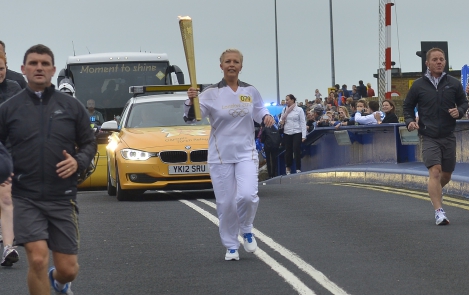-
Reset
+


“Inspiring a generation* – a look back at London 2012" - Kodukiri magazine, September 2012
03.09.2012
When we went to visit the Old Believers on the shores of Lake Peipus this summer and Nikolai Djukov invited us in for a cup of tea, I had no idea that the London Olympics would begin for me right there in his back yard in the village of Kasepää. And in fact I only realised it had that night in August when, all on my lonesome, but at the same time with more than 300,000 other Estonians, I sat in front of my television nervously awaiting the increasingly delayed start of Heiki Nabi's battle for wrestling gold.
I'll be honest: my knowledge of Greco-Roman wrestling up to that point couldn't rightly be described as extensive. That's why I happily took Nikolai up on his offer to show us his 'wrestling hall' after he'd brought us into his home and let us into the everyday lives of the Old Believers, showing us the long, hand-tilled rows of onions that are characteristic of this little corner of the world. The hall turned out to be a small shed, in which the youngest member of the family, 8-year-old Sasha, took on an inanimate opponent matching his height and weight and showed us all the moves you're meant to make on the wrestling mat. We were surprised to hear that pretty much all of the boys in Kasepää and Kolkja wrestled, and that more and more girls were joining them, with Nikolai training them all. I had no idea how valuable that tutorial was until I saw with my own eyes what Heiki Nabi achieved at the Olympics.
Nikolai told me how important it was for children living in such a tiny place to have something truly interesting and challenging to do in their free time. And the fact that for the most part this depends entirely on individual enthusiasts was something that Henn Põlluste, proud trainer of newly crowned Olympic silver medallist Heiki Nabi, himself remarked upon. Really good Estonian wrestlers are only found in two or three areas, they say, where their trainers really know how to inspire them. But what an Olympic medal means to the sport as a whole is something that can't be overestimated.
And yet there were still those who complained that two medals for a nation of a million people wasn't enough. Worse, there were an unprecedented number of people writing off the entire Olympic team before the games had even begun. What gives anyone in the media the right to label someone who's one of the top 50 athletes in their sport an 'Olympic tourist'? All but one of the sportsmen and -women we sent to London finished within that remarkable group, and many of them even made the top 15. How many people are there in Estonia who could honestly claim to be within the top one hundred in their field? Do these naysayers have any idea what these athletes do, and how much they give up, and how much they have to overcome to achieve what they have? It's easy to mouth off, but they don't seem to know or care what these athletes do every day in order to realise their dreams. I was taken aback when one of the biggest stars of these Olympics, Usain Bolt, was so direct in response to the question "Where next?" after setting a new world record: he said he didn't have a goal in life. It was as though he was cut off from it – after all, what could be worse than not having something to aim for in life? When asked whether he'd considered making the change from sprinting to long-distance running, he was even more frank: "I know what kind of training they go through," he said. "I don't wanna be throwing up every day. I like my lunch too much!" Such is the price of reaching the top.
Every victory is great. But we shouldn't forget that alongside the Olympic motto of citius, altius, fortius – faster, higher, stronger – is the no less important "It's not the winning, but the taking part".
The five interconnected Olympic rings symbolise the five continents, which together form a whole. The six colours on the Olympic flag unite all of the world's countries, since they're taken from all of their flags. One of the chief organisers of London 2012, Lord Sebastian Coe, said when declaring the games closed that in fact they weren't over at all: they were designed to inspire an entire generation, all over the world. In a country as small as ours, the fact that little girls have been inspired by Reena Pärnat to try archery, and boys and girls to have a go at fencing from watching Nikolai Novosjolov, and thousands of women to take to the running track encouraged by the enthusiasm of Evelin Talts is every bit as important as our medal-winning heroes. I can just feel the boost that Heiki Nabi gave those little wrestlers in Kolkja as they watched his Olympic matches. Anything is possible – you simply have to believe and work hard.
Sports stars can provide us with moments of excitement and jubilation and an unparalleled sense of togetherness. But what's more important is that in inspiring us, they help us to be better, happier, harder-working people. For that we owe them a good deal of thanks!
* "Inspire a generation" was the slogan of the London 2012 Olympic Games.



